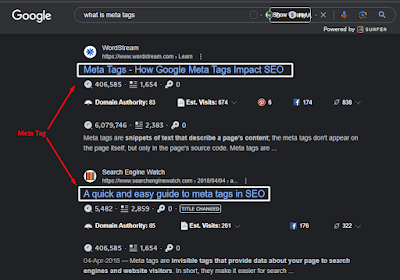Introduction
In the consistently developing scene of computerized showcasing and site website optimization, one term often comes up as "meta tags." If you're wondering, "What are meta tags, and why do they matter?" you're in the right place. This comprehensive guide will delve deep into meta tags, exploring their role in SEO (Search Engine Optimization), their different types, and how to optimize them effectively. By the end of this article, you'll have a solid understanding of meta tags and how to use them to enhance your website's performance.
What Are Meta Tags?
Meta labels are bits of HTML code that give data about a site page to web crawlers. They assume an essential part in assisting web search tools with understanding the content and context of a webpage. While not visible to website visitors, meta tags are vital for search engine algorithms.
Types of Meta Tags
Understanding the various types of meta tags is essential for optimizing your website effectively. Here are some key meta tags you should be aware of:
- Meta Title Tag: This tag defines the title of a webpage and appears as a clickable link in search engine results. It's a critical element for SEO, as it directly impacts click-through rates.
- Meta Description Tag: The meta description tag briefly summarizes the webpage's content. It influences whether users decide to click on your link or not.
- Meta Keywords Tag: This tag was used to list relevant keywords for a webpage. However, most search engines no longer consider it a significant ranking factor.
- Meta Robots Tag: This tag instructs search engine bots on crawling and indexing the webpage. It can prevent certain pages from being indexed.
- Meta Viewport Tag: Specifically for mobile optimization, this tag defines how a webpage should be displayed on different devices.
Why Are Meta Tags Important for SEO?
Meta tags are the gateway between your website and search engines. Here's why they are crucial for SEO:
- Improved Click-Through Rates (CTR): A well-optimized meta title and portrayal can captivate clients to tap on your connection, increasing your CTR.
- Keyword Relevance: Meta tags help search engines understand the keywords and topics your content covers, making it easier to rank your site for relevant queries.
- Enhanced User Experience: When meta tags accurately represent your content, users are more likely to find what they want, leading to a better overall experience.
- Crawlability: The meta robots tag can guide search engine bots in efficiently navigating and indexing your site.
Optimizing Meta Tags for Better SEO
Now that you know the importance of meta tags, let's explore how to optimize them effectively:
- Focus on Relevant Keywords
Incorporate target keywords naturally into your meta title and description. Ensure they align with the content on your webpage.
- Keep it Concise
Meta titles should be under 60 characters, while meta descriptions should not exceed 160. This ensures they display correctly in search results.
- Create Unique Tags
Avoid using duplicate meta tags across multiple pages. Each page should have a unique meta tag set that accurately represents its content.
- Use Schema Markup
Leverage schema markup to provide additional context to search engines. This can enhance how your content appears in search results.
FAQs
Q: Do meta tags directly impact my website's ranking?
A: While meta tags are essential for SEO, they are just one-factor influencing rankings. Content quality, backlinks, and site speed also play significant roles.
Q: How often should I update my meta tags?
A: Regularly review and update your meta tags, especially when you add new content or make significant changes to existing pages.
Q: Are meta keywords still relevant?
A: No, meta keywords are no longer a major ranking factor. Search engines primarily focus on content and user experience.
Q: Can I use the same meta title and description for every page?
A: It's best to create unique meta tags for each page to represent its content and maximize SEO benefits accurately.
Q: What is the ideal length for a meta description?
A: Aim for a meta description between 150 and 160 characters to ensure it displays fully in search results.
Q: Are meta tags the only factor for on-page SEO?
A: No, on-page SEO encompasses various elements, including meta tags, content quality, URL structure, and internal linking.
Conclusion
Meta tags are a fundamental aspect of Web optimization that can influence your site's perceivability and user engagement. By understanding their role and optimizing them effectively, you can improve your website's performance in search engine results. Remember to stay updated with SEO best practices as search engine algorithms evolve.


.jpeg)

.jpeg)

.jpeg)
0 Comments